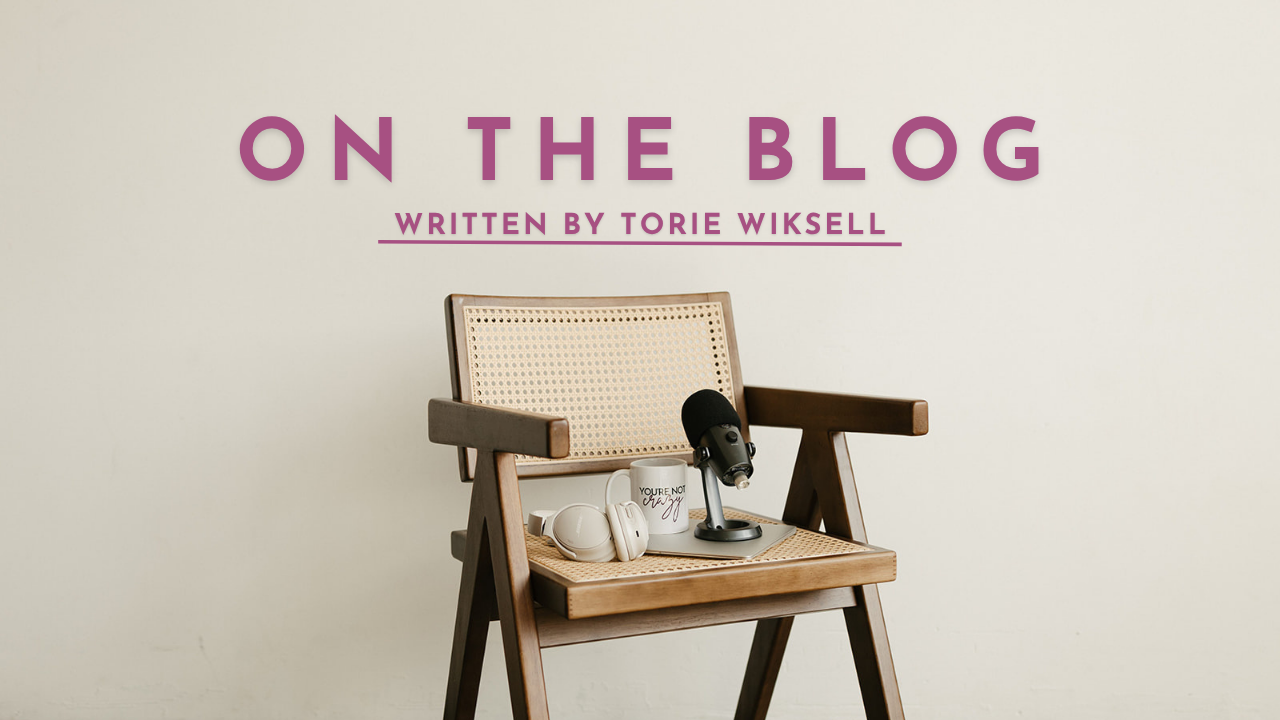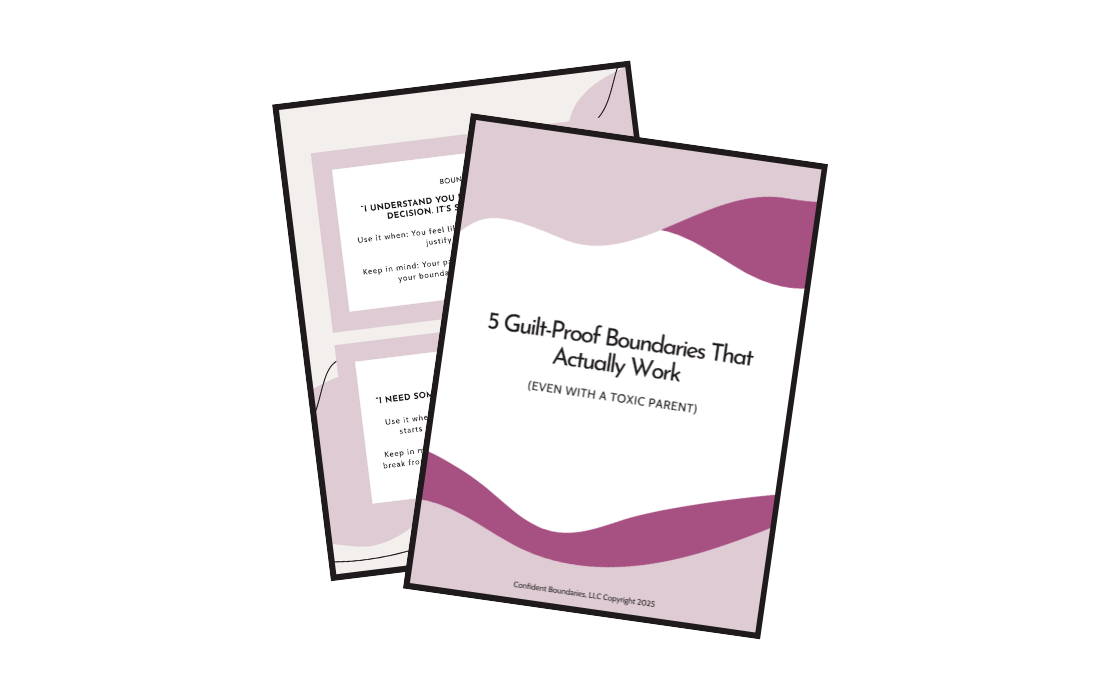
Should You Set Boundaries or Go No-Contact with Your Toxic Parent?
Let’s get real: navigating a relationship with an emotionally immature parent isn’t just hard—it’s soul-depleting.
Especially if your parent has narcissistic or borderline traits, you’ve probably spent years (or decades) stuck in a cycle of guilt, confusion, and emotional exhaustion. You’re constantly asking yourself:
Do I try one more time to set a boundary... or do I finally walk away?
If you’re caught in that agonizing tug-of-war, I want you to hear this loud and clear:
You’re not broken. You’re not ungrateful.
You’re a cycle breaker.
And making this decision—whether to set boundaries or go no-contact—isn’t about “giving up.”
It’s about choosing your peace over your parent’s dysfunction.
When Dealing With a Toxic Parent Is Slowly Destroying You
If every interaction with your parent leaves you feeling like you just got hit by a truck, you’re not imagining things.
This is what happens when you’re dealing with toxic parents:
-
You set a boundary, and they immediately trample it.
-
You try to express how you feel, and they call you dramatic or ungrateful.
-
You stay connected out of guilt, and still feel more alone than ever.
Sound familiar?
That’s because emotionally immature parents don’t respond to healthy communication the way emotionally mature adults do. And no matter how much effort you put in—it’s never enough to change them.
Eventually, the emotional drain becomes so severe that even having minimal contact starts to feel like too much. That’s not you being cold or heartless. That’s you realizing that self-preservation is not optional anymore.
Let’s Talk About Going No Contact (Without Shame)
I imagine that I don't have to tell you...
Going no-contact isn’t about revenge.
It’s not a power play.
It’s not something you do on a whim.
It's a last resort to maintain your sanity.
It’s what happens when setting boundaries with a toxic parent hasn’t worked—because they refuse to respect even the most basic limits.
It’s what happens when you’ve tried therapy, communication, compassion, and clarity… and all you’ve gotten in return is more pain.
So if you’re at that breaking point, please know:
Choosing distance isn’t failure. It’s strength.
It’s you saying:
I am no longer available for this chaos.
I am no longer going to be the only one trying to make this work.
I am no longer sacrificing my mental health to keep a dysfunctional dynamic alive.
And if that makes you the “villain” in their story—so be it.
Challenging the “But It’s Family” Myth
Let’s address the elephant in the room: guilt.
You’ve probably been told your whole life that “family is everything.” That “you only get one mother” or that "your dad is doing his best." That it’s your duty to maintain the relationship—no matter how damaging it is.
But here’s the thing:
Loyalty means nothing if it costs you your safety.
And biology is not a free pass for abuse.
You don’t owe continued access to people who’ve made you feel small, scared, or invisible—just because they share your last name.
Why This Feels So Damn Hard
If you were raised in a dysfunctional family, emotional self-abandonment is probably your default setting. You learned to keep the peace, read the room, and make yourself smaller to survive.
So when you start prioritizing your needs—your peace, your safety, your truth—it feels unnatural.
It feels selfish.
It might even feel “wrong.”
But this discomfort doesn’t mean you’re doing the wrong thing.
It means you’re doing something new. Something healthier.
Boundaries or No-Contact? What’s the Right Choice?
There is no one-size-fits-all answer here.
Some people thrive with low-contact. Others need full separation. Some start with boundaries and eventually choose distance later on.
There is no “right” decision—only the one that honors your nervous system, your values, and your capacity.
And guess what?
You’re allowed to take your time.
You’re allowed to change your mind.
You’re allowed to grieve what could have been.
There is no perfect decision. You do your best to make a thoughtful one and then you go from there.
What Healing Really Looks Like
Healing from a parent with borderline or narcissistic personality traits isn’t linear.
You’ll have moments of peace and moments of pain.
You’ll feel empowered one day and gutted the next.
But here’s what you’ll also feel:
-
More clarity
-
Less self-doubt
-
A deeper connection to yourself
-
And—over time—relief
Because you’ll no longer be waking up every day trying to survive someone else’s emotional instability.
You’ll be living your life on your terms. With boundaries. With intention. And with more peace than you ever thought possible.
Final Thoughts
If you’ve been wondering whether to set a new boundary—or walk away completely—here’s what I want you to remember:
You’re not selfish.
You’re not weak.
You’re not crazy.
You are someone who was never given the emotional safety they needed—
and you are finally giving it to yourself.
That is not betrayal.
That is breaking the cycle.
And I’m so freaking proud of you for even considering it.
Want more support in making this decision?
- Take my free workshop, Setting Boundaries with a Parent You Suspect Has Borderline or Narcissistic Personality Disorder- I'll teach you how to set boundaries with difficult parents so you can be confident you've tried everything before deciding to go low- or no-contact
- Check out Pre-Boundaries: The Step That Comes First—my $49 mini-course that walks you through the patterns of BPD/NPD parents and helps you lay the foundation for boundaries that actually stick.
- Join me in the Confident Boundaries Membership, where you can connect with other people who get it—while learning effective ways to break the cycle and take back control of your life
You’re not alone. You’re not the problem. And you’re far more capable of healing than you probably give yourself credit for.
You’re Not Crazy.
But you might have been gaslit by your parents.
Learn how to recognize the signs—and start rebuilding trust in yourself.
I hate SPAM. I will never sell your information, for any reason.



